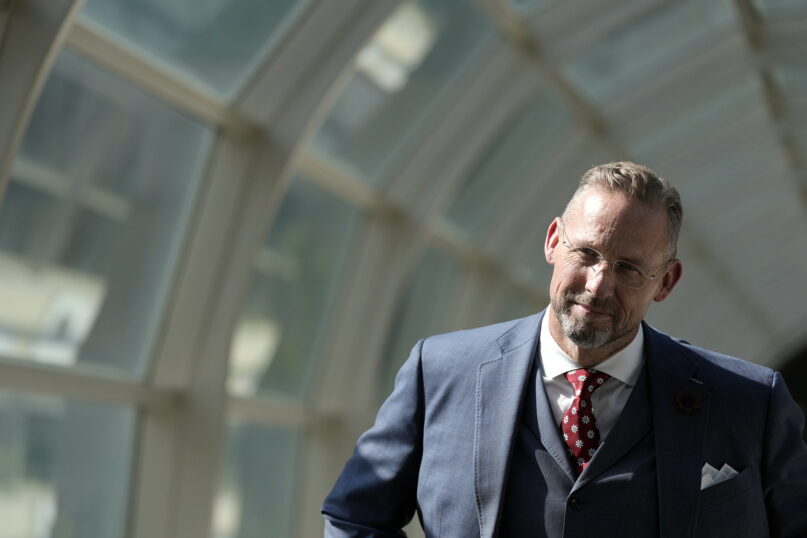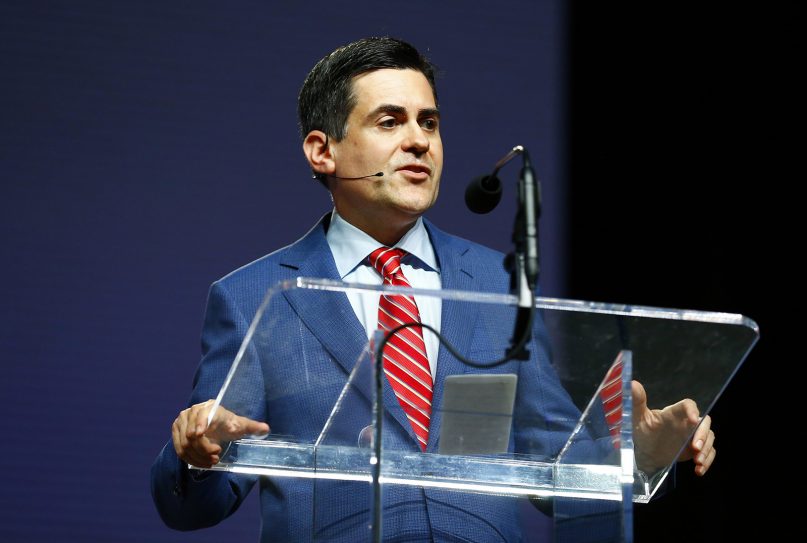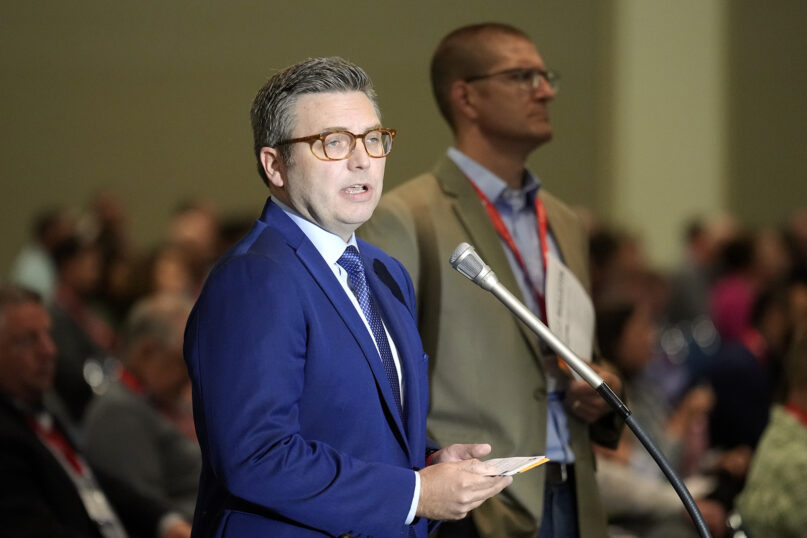
(RNS) — During their annual meeting in Dallas next month, Southern Baptists will sing, bless missionaries, pass a budget, listen to sermons and engage in lively debate about a host of issues.
Among those issues: what to do with the denomination’s Ethics and Religious Liberty Commission. For nearly a decade, the ERLC has been a source of controversy as the nation’s largest Protestant denomination has navigated the cultural and political divides of the Trump era.
While Southern Baptists, like many evangelicals, have been strong supporters of President Donald Trump in the voting booth, some of the president’s policy decisions and personal conduct have clashed with Baptist ethics and beliefs.
That’s left the ERLC, which speaks to ethical issues and public policy debates, occasionally at odds with the denomination’s 12.7 million members, leading to three attempts to disband or defund the agency over the past decade.
Clint Pressley, president of the Southern Baptist Convention, said he has spoken to a number of Southern Baptists about the ERLC – including Texas megachurch pastor Jack Graham, a past critic of the agency.
Some like what the agency is doing, he said. Others don’t.

Southern Baptist Convention President Clint Pressley at the SBC annual meeting at the Indiana Convention Center in Indianapolis, June 12, 2024. (RNS photo/AJ Mast)
While he suspects there will be a motion to close the agency at the denomination’s annual meeting in June, Pressley said the future of the ERLC is not up to him. Even if he had concerns about it, he’s got no power to make a decision. Instead, that power rests with church representatives known as messengers.
“I think those concerns about the ERLC will be answered by the messengers,” said Pressley, pastor of Hickory Grove Baptist Church in Charlotte, North Carolina. “I can’t do anything about the ERLC.”
Pressley added that his role as chair of the SBC’s annual meeting means he cannot take sides in any debate over the ERLC.
In recent months, both the ERLC and its critics have engaged in an online public relations war over the agency’s reputation and future. The Center for Baptist Leadership, a startup activist group with ties to American Reformer magazine, has run a series of articles, podcast episodes and social media posts critical of the ERLC — primarily for its stances on immigration reform and lack of close ties to the Trump administration.
The ERLC has promoted its ties to House Speaker Mike Johnson, a former ERLC trustee, and its support for defunding Planned Parenthood, as well as its opposition to gender-affirming care for minors and “radical gender ideology.”
“The ERLC team has been diligently working to advocate for Southern Baptist beliefs in the public square while also providing meaningful resources that help our churches navigate today’s cultural challenges and gospel opportunities,” Scott Foshie, chair of the ERLC’s trustees, told RNS in an email. “Southern Baptists have supported an ethics and public policy entity for over a hundred years. We need an effective, responsive ERLC now more than ever.”

Russell Moore speaks during the annual meeting of the Southern Baptist Convention at the Birmingham Jefferson Convention Complex, June 12, 2019, in Birmingham, Ala. (RNS photo/Butch Dill)
Discontent with the ERLC has been festering for years — and much of it dates back to the tenure of former ERLC President Russell Moore, who led the agency from 2013 to 2021.
A popular figure at first, Moore faced intense backlash from Trump allies such as Graham, a former SBC president and pastor of Prestonwood Baptist Church near Dallas, when he refused to back Trump’s first run for presidency and criticized him instead. In 2017, Prestonwood and about 100 other churches withheld their donations to the SBC’s Cooperative Program in protest of Moore’s action. A pair of leaders of the SBC’s Executive Committee also clashed with Moore over his criticism of Trump.
While Moore resigned in 2021, tension over the ERLC has remained a constant in SBC life. The agency has also faced internal conflict — last summer, a former ERLC chair announced that the agency’s president, Brent Leatherwood, had been fired after a social media post praising then-President Joe Biden. The following day, that chair was ousted and the entity’s board announced Leatherwood was still on the job.

Brent Leatherwood speaks from the floor of the Southern Baptist Convention annual meeting at the Indiana Convention Center in Indianapolis, June 12, 2024. (RNS photo/AJ Mast)
There have been three votes to defund or disband the ERLC since Trump took office the first time — all of them have failed but between a quarter and a third of messengers at the 2024 annual meeting appeared to support closing the agency. The SBC’s rules require two votes in successive annual meetings to shut down an entity such as the ERLC.
Randy Davis, executive director of the Tennessee Mission Board, told Religion News Service in an interview that he still believes the ERLC plays a helpful role for Southern Baptists. He said the ERLC, for example, had worked closely with Tennessee Baptists on issues such as sexuality and gender — Tennessee Baptists, like the ERLC, support a state law that bans gender transition surgery for minors.
Davis doesn’t think the convention floor is the best place to decide the future of the ERLC. Instead, he’d rather a commission be set up to discuss the SBC’s ministry as a whole — and where the ERLC fits into that mission.
“I think Southern Baptists would appreciate that kind of careful collaboration and consideration, rather than being divided on the floor of the convention,” he said.
The ERLC set up a church engagement office after the vote at the 2024 SBC meeting — and encouraged staff to abide by a set of guidelines in deciding what issues the entity should speak to.
“We have sent surveys requesting feedback, hosted pastor calls, led groups of pastors to meet with elected leaders in DC, and intentionally attended events where pastors and other ministry leaders were gathered,” Miles Mullin, an ERLC vice president, said in an email.

R. Albert Mohler, president of the Southern Baptist Theological Seminary, speaks from the floor during the Southern Baptist Convention annual meeting at the Indiana Convention Center in Indianapolis, June 12, 2024. (RNS Photo/AJ Mast)
Al Mohler, a former ally of Moore and the ERLC and president of the SBC’s largest seminary, is now among those who have doubt about the entity’s future. Mohler, a former “Never Trumper” turned supporter of the president, told a popular SBC podcast recently that he had “grave doubts” about the usefulness of the ERLC — and that having an entity that addresses controversial cultural issues is “a risky proposition.”
“Other entities and the churches themselves have grave doubts about the utility of the ERLC,” Mohler told the “Baptist 21” podcast last month. Mohler added that as the head of an SBC entity, he could not lead any effort to disband the ERLC.
Texas pastor Andrew Hebert said he’d like to see the ERLC limit itself to speaking only about issues that are directly addressed in the denomination’s statement of faith — known as the Baptist Faith & Message — or in recent resolutions passed at the SBC’s annual meeting. He outlined that proposal in a recent article on The Baptist Review, a website that discusses SBC issues and theology. Those boundaries, he said, could help the ERLC from stepping on land mines.
Hebert admits his solution isn’t perfect. For example, the SBC has passed a series of resolutions on immigration that call for both border security and humane treatment of immigrants — praising churches that assist immigrants and refugees — as well as calling for “a just and compassionate path to legal status.” Yet the ERLC has been criticized for its involvement in immigration reform— as well as for refusing to back legislation that would jail women who choose abortions.
The ERLC will deal with some controversy, Hebert said. But he hopes that for the most part, the ERLC will speak on issues where Southern Baptists have a “broad consensus.”
Something has to change for the ERLC to continue, he said.
“I think the writing is on the wall that there is a trust and credibility issue,” he said. “My motion is an attempt to provide a solution without defunding or disbanding the ERLC.”
